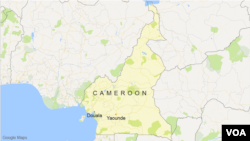Social media use has risen sharply in Cameroon, as have the government’s efforts to control it.
Our story begins at a church in Limbe, in southwestern Cameroon. These church members are praying for three men.
A military court ruled against the three earlier this month. The men were arrested after they reportedly shared a joke about a membership campaign for the Boko Haram terrorist group on social media.
The trial was not open to the public. The rights group Amnesty International and local rights activists condemned the court’s ruling.
Tabot Timothy is a 22-year-old law student at the University of Douala-Cameroon. He joined others at the religious center one day recently to protest the ruling.
“It was just normal for a thorough investigation to be carried out to really ascertain the fact that these guys were joking. It is unjust. Thorough investigations were not carried out.”
The government has used several laws to limit mobile and online communication, including an anti-terrorism law passed in 2014.
Barrister George Marcellin Tsoungui is with the Cameroon Bar Council.
He says people who use social media to spread unproven information can be sentenced to between six months and two years in prison and fined $10,000 to $20,000. He says the punishments can be twice those amounts if a court rules that the communications were designed to cause unrest.
Police detained a journalist in January after he incorrectly reported on social media that President Paul Biya had visited soldiers in Cameroon’s north.
In March, police arrested people accused of sharing a letter from the country’s minister of defense on social media. The letter was released without the minister’s permission. It said that Boko Haram members had arrived in the capital, Yaounde.
The National Communications Council has the power to stop reporters from working and close media businesses. It is investigating 20 complaints made by top government officials. One of the reports is about a minister who was seen on Facebook dancing to the music of Franko -- a singer whose songs are banned by the government.
Yet social media and mobile messaging apps and networking sites are increasingly popular in Cameroon. In fact, they are used by both opponents and supporters of the government.
Nelson Tawe has examined the spread of social media in Cameroon.
“Social media is inevitable. It’s like a devil that you are called upon to live with. It’s difficult to suppress it. It’s just going to be like throwing water on the duck’s back. Social media has come to stay -- there’s no way you can suppress it. I think that (the) government will have an uphill task to succeed in what it’s trying to do.”
Several other African countries have taken actions against people who use social media in ways governments believe are illegal.
I’m Christopher Jones-Cruise.
Moki Edwin Kindzeka reported this story from Yaounde. Christopher Jones-Cruise adapted his report for Learning English. George Grow was the editor.
We want to hear from you. Write to us in the Comments Section, or visit our Facebook page.
______________________________________________________________
Words in This Story
ascertain – v. to learn or find out (something, such as information or the truth)
mobile – adj. cell phone; smart phone
journalist – n. reporter; a person who collects, writes and edits news stories for newspapers, magazines, television, radio or the internet
app – n. a computer program that performs a special function, especially on a smartphone
inevitable – adj. sure to happen







